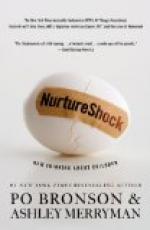|
This section contains 366 words (approx. 1 page at 400 words per page) |

|
NurtureShock: New Thinking About Children Summary & Study Guide Description
NurtureShock: New Thinking About Children Summary & Study Guide includes comprehensive information and analysis to help you understand the book. This study guide contains the following sections:
This detailed literature summary also contains Topics for Discussion on NurtureShock: New Thinking About Children by Po Bronson.
Nurtureshock by Po Bronson and Ashley Merryman describes the effects of new scientific research on old beliefs about child development and education. Ranging from language acquisition to lying and measuring intelligence for gifted programs to devising strategies for resolving conflicts between children, and the effect of praise and sleep patterns on children's development, Bronson and Merryman show that the old assumptions about how children function are often faulty. They run against what scientists have learned about hormonal development, brain chemistry and wiring, and, oftentimes, plain commonsense experience. While parents and teachers are good at eliciting behavior that makes the adults feel good about their accomplishments with the children, Bronson says that more often, the children really benefit from strategies that follow two rules: pay attention to the child's developmental needs, and recognize the complexity of overlapping desirable and undesirable traits like lying, which can be useful, and teens arguing with parents, which can actually be a sign of respect.
Almost all of the chapters in Nurtureshock follow the same pattern: Bronson describes the old science, describes the research that was done more recently, and then describes either the successes the researchers had when they implemented new programs, or describes the new facts researchers have discovered about the complexity of children's behavior.
The ten chapters in Nurtureshock address the following topics in child development and education: praise and its effects on children's esteem; the benefits of sleep for child development; the consequences of white parents refusing to talk about race; why kids lie; whether tests can measure giftedness in kindergarteners; whether siblings affect children's development; how to read teen rebellion; how to teach self-control; how to resolve students' conflicts, and how students acquire language. The conclusion, which is ostensibly about the study of happiness in students, is really a meta-analysis of the process by which tricky problems like happiness—or any of the other topics in the book—are studied. Focusing on how researchers have modified their studies, Bronson and Merryman propose that theories do better when they attend to the children's behaviors recognizing the full complexity of children's concerns and experiences, instead of foisting adult ideas and values on children.
Read more from the Study Guide
|
This section contains 366 words (approx. 1 page at 400 words per page) |

|



